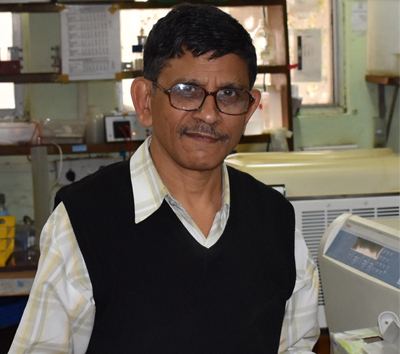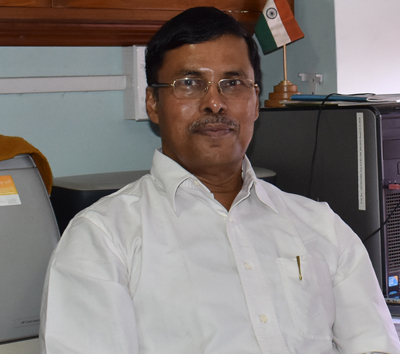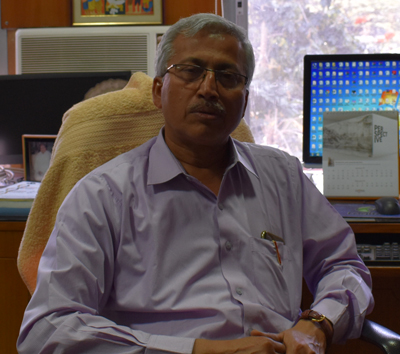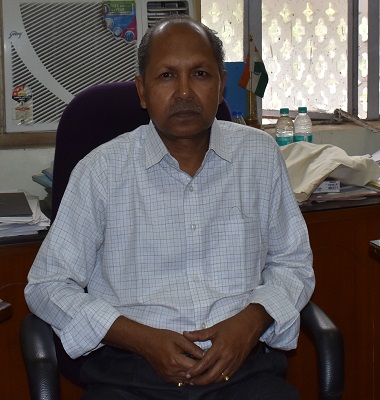Former Faculty
Reasearch statement:
Our lab has been working on the molecular characterization of cypovirus infecting tasar silkworm Antheraea mylitta. We have purified the virus, examined its structure by electron microscopy and showed by molecular analysis that it is a cytoplasmic polyhedrosis virus belongs to the Reoviridae family containing eleven (S1-S11) double stranded segmented RNA in its genome. Functional analysis of these genome segments has been done by cloning, sequencing and expression in E. coli and insect cells to understand their roles in viral replication and pathogenesis. We have shown that S10 encodes polyhedrin to form polyhedra, S9 encodes a non-structural protein having RNA binding property to help viral packaging, S8 and S7 encodes viral structural proteins, S6 encodes a protein having ATP binding and ATPase activity, S2 encodes viral RNA dependent RNA polymerase, S5 encodes guanylyltransferase and S4 methyl transferase for capping 5? end of viral RNA, S1 and S3 encodes viral minor and major capsid proteins. Currently we are working to determine the crystal structure of viral polymerase for the development structure based anti-viral compounds and raising antibodies (polyclonal and monoclonal) against viral capsid proteins to develop a sensitive viral detection system. An EST database of this silkworm has been established for functional analysis of genes involved in silk gland development. We have purified a fungal protease inhibitor from the hemolymph of this silkworm, characterized it molecularly and determined its structure by X-ray crystallography. We are now working on microsporidia infecting these silkworms to improve tasar sericulture in India, and also characterizing major silk proteins, fibroin and sericin for their use as biomaterials. In addition, we are purifying anti-microbial peptides from the hemolymph of these silkworms for their use as potential therapeutics against ant-biotic resistant bacteria. Recently we are also characterizing microbes present in stored food grains.
| Contact: | aghosh@bt.iitkgp.ac.in |
| +91-3222-283762 |
Reasearch statement:
Dr. Debabrata Das has pioneered the promising R&D of Bioenergy production processes by applying fermentation technology. He is actively involved in the research of hydrogen biotechnology for a period of last seventeenth years. His commendable contributions towards development of a commercially competitive and environmentally benign bioprocess using Klebsiella pneumoniae IIT-BT 08 which as of today is known to be the highest producer of hydrogen by fermentation. He has also established thermophilic hydrogen production process for the utilization of the higher temperature industrial wastes like distillery effluent. His recent work on biohythane process for the maximization of gaseous energy recovery from the organic wastes is worth mentioning. Prof. Das is also involved in CO2 sequestration, biohydrogen, biodiesel, phycobillin protein etc. production from microalgae research work. The major aim of the research work on MFC was to synchronize the bioremediation of wastewater with clean energy generation. Presently, he has the Google h-index of 37 for his research work. He has about 126 research publications in the peer reviewed journals and contributed more than 22 chapters in the books published by International publishers. He is the author of the book entitled ?Biohydrogen Production: Fundamentals and Technology Advances? published by M/s. CRC Press, New York. He is the Editor of the book entitled ?Algal Biorefinery: An Integrated Approach? published separately by Springer, Switzerland and Capital Publishing Company, India. He has two Indian patents. Presently, he is involved with 10 m3 pilot plant study for the commercial exploitation of biohydrogen production process. He was awarded IAHE Akira Mitsue award 2008 and BRSI Malaviya Memmorial award 2013 for his contribution in hydrogen research. He is the Editor-in-Chief of American Journal of Biomass and Bioenergy. He is the member of the editorial board of several International Journals. He is the Fellow of IAHE, INAE; IE(I); BRSI; WAST.
| Contact: | ddas@bt.iitkgp.ac.in |
| +91-3222-283758 |
Reasearch statement:
Dr. Satyahari Dey is a Professor in Department of Biotechnology, IIT Kharagpur. Professor Dey?s R&D are in plant/microbial biotechnology concerning Bio-prospecting genes/molecules, Molecular profiling, Prebiotics; pro-/psychobiotics nutraceuticals bioproducts (important contributions- sandalwood (cyclosaplin), Growtek bioreactor, prebiotics (Thelebolan). Professor Dey is the recipient of Technology Day Invention Award. Professor Dey is Managing Director, STEP IIT Kharagpur; Deputy Secretary General, and Chair, Bioeconomy & Biobusiness, AFOB, and Vice President, India Regional Branch Office, AFOB.
The Plant Biotechnology (PBT) Laboratory led by him has thrust on the extraction, purification, chemical characterization and bioactivity testing of new prebiotic molecules sourced from plants and microbes. The molecules from grain crops (jowar, bajra, ragi & colored rice), psychrophiles (Sphingobacterium and Thelebolus), sandalwood, Santalum album, marine cyanobacterium Aphanothece sp., and a probiotic isolate Lactobacillus fermentum are under investigation. The interactive beneficial gut microflora (probiotics), pathogenic microflora and human intestinal cells are important determinants of human health, triggered by a small group of dietary carbohydrate molecules (prebiotics). Psychobiotics (probiotics produceing neuroactive compounds) act on brain-gut axis, influencing mental health as well, and are being tested to decipher related metabolic events, using germ-free/gnotobiotic mice as animal model for in vivo studies on colonization (by biofilm formation) and metabolism of prebiotic substrates.
| Contact: | sdey@bt.iitkgp.ac.in |
| +91-3222-283760 |
Reasearch statement:
LAB RESEARCH SUMMARY: Our laboratory works on isolation and characterization of anticancer and immunomodulatory biomolecules and tissue engineering matrices from natural sources. Currently, the focus of the lab is fabrication of in vivo-like organ models on microfluidic chips (called biochips) to study physiological phenomenon like vasculogenesis, autophagy and disease models for chronic myeloid leukemia and osteoarthritis. These models can be used to screen various drugs in a multiplexing mode, circumventing conventional mice experiments and to develop a therapeutic regime of the drug. Tissue Engineering : (i) Vascular Tissue Engineering ? Fabrication of vascular tissue constructs using modular tissue engineering approach using goat tendon collagen as base material, and developing a micro-scale platform for high throughput screening of antiangiogenic and anticarcinogenic drugs. (ii) Osteochondral Tissue Engineering - Developing an in vitro bio-mimetic tissue platform of human osteochondral complex. The platform will be used for understanding the consequences of biophysical and biochemical cues on degenerative changes in the cartilage and cartilage/bone interface and can be used as osteoarthritis drug screening platform. (iii) Liver Tissue Engineering ? Design and fabrication bio-artificial liver on a chip using dielectrophoresis based three-dimensional cell patterning in micro-confinements. This system may find application in high throughput screening of drugs/therapeutics related to tissue regeneration and lymphatic disorder. Biomicrofluidics : (i) Cancer stem cells and Leukaemia - Development of an in vivo-like microarchitecture on microfluidic platform to understand the complex dynamic biophysical interactions between hematopoietic or leukaemia stem cells and their niche. The platform will be used as a scheme to detect and target leukemia stem cells in clinical settings. (ii) Mechanobiology and Autophagy To understand, how different biophysical factors and stress acting on cancer cells, which elicit cellular responses like autophagy and how such response govern processes like cellular migration, invasion and survival.
| Contact: | tkmaiti@bt.iitkgp.ac.in |
| +91-3222-283766 |





